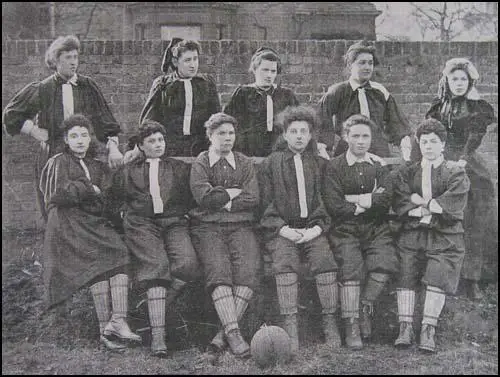 This is the first British Ladies' Football Club, which played twice a week on the fields below Alexandra Palace, trained by a Tottenham Hotspurs player. It was started by Nettie Honeyball (not her real name!) in 1895, who told the Daily Sketch: "I founded the association ... with the fixed resolve of proving to the world that women are not the ‘ornamental and useless’ creatures men have pictured. I must confess, my convictions on all matters where the sexes are so widely divided are all on the side of emancipation, and I look forward to the time when ladies may sit in Parliament and have a voice in the direction of affairs, especially those which concern them most." Nettie lived in Crouch End.
This is the first British Ladies' Football Club, which played twice a week on the fields below Alexandra Palace, trained by a Tottenham Hotspurs player. It was started by Nettie Honeyball (not her real name!) in 1895, who told the Daily Sketch: "I founded the association ... with the fixed resolve of proving to the world that women are not the ‘ornamental and useless’ creatures men have pictured. I must confess, my convictions on all matters where the sexes are so widely divided are all on the side of emancipation, and I look forward to the time when ladies may sit in Parliament and have a voice in the direction of affairs, especially those which concern them most." Nettie lived in Crouch End.
More info. on the Spartacus Educational website, including different accounts in contemporary newspapers - not all mocking and condemnatory!

Replies
I heard that they didn't play in Alexandra Park, but just south of the park (in an area now built on) - correct me if I am wrong.
One question has been bugging me about these women footballers in Alexandra Park – did the first black woman football player in Britain play for this club? The answer seems to be – yes she did! This picture in last year’s Guardian shows Emma Clarke in the top row, second from the left:
But the caption 'Mrs. Graham's Football XI in 1895' is misleading – either they have got the wrong team, or the wrong year.
Emma had been a confectioner’s apprentice in Merseyside, where she and her sisters were said to have played football in neighbourhood streets – so probably a very different background from that of middle-class Nettie Honeyball (real name probably Jessie Allen) in Crouch End.
These working-class women (including at least 2 Clarke sisters) could afford to come down south to play in the Alexandra Park Club because they were paid – probably about 1 shilling a week with food and accommodation, which was said to be a reasonable wage. The Club did not lack funds – they charged for admission, and played nearly 200 matches all over England, Scotland and Wales in 1895-6, to audiences of thousands. They also contributed to charities.
The 'Mrs. Graham' (Helen Graham Matthews) mentioned above also played for the British Ladies' Football Club at this date. She was more experienced and older (in her 30s) than most of the players, and as a Scot (though living in Merseyside), had herself arranged several Scotland versus England matches back in the 1880s. These had been more informal, and less well publicised, than those of the BLFC in Alexandra Park. The latter's first match in Alexandra Park was attended by about 10 thousand people, and was reported in most newspapers (disparagingly, on the whole!). Nettie had advertised for players the previous year in several newspapers, and given interviews, before choosing her teams.
The BLFC benefited from the patronage of Lady Florence Dixie, sister of the Marquis of Queensberry (famous for giving his name to the Queensberry rules in Boxing, as well as the notorious conflict with Oscar Wilde). She advocated the healthiness of the sport, as against the medics and others who declared it damaging to women's bodies. She was also keen on clothing reform - no corsets for these footballers - and thought that football clothing was a good place to start.
The Scottish FA was more repressive at this time than the English FA, which may be a reason why Mrs.Graham agreed to join Nettie Honeyball's club (they were also both suffragists). Her playing - often, like Emma Clarke, as a goalkeeper - was frequently commended by journalists.
The following year, the BLFC split, with Mrs. Graham leading a rival club, which she considered more professional than Nettie's. The Clarke sisters joined her, and continued to play for the club for another 7 years or so. Nettie Honeyball appears to have continued with the original club, abandoning her pseudonym (according to one theory, to distance herself from the jibes of Mrs. Graham).
The confusion over the caption to the picture above concerns whether the team was indeed Mrs. Graham’s, in which case it could not have been taken in 1895 when Emma had joined Nettie's club, or if it was one of the two teams in the latter – known as North and South – who nearly always played against each other. North London played in red and white, and South London in two shades of blue. The picture below shows Emma Clarke in the South team in 1895, in the back row, second from the left (same position as in the picture above):
Incidentally, there was apparently a folk custom of women playing football in some areas of Scotland - an annual match of single versus married women.
Great piece of history - thanks!
How interesting - thanks so much for posting. Yet another historical first for Ally Pally. I had no idea this was the actual first ever women's football club.